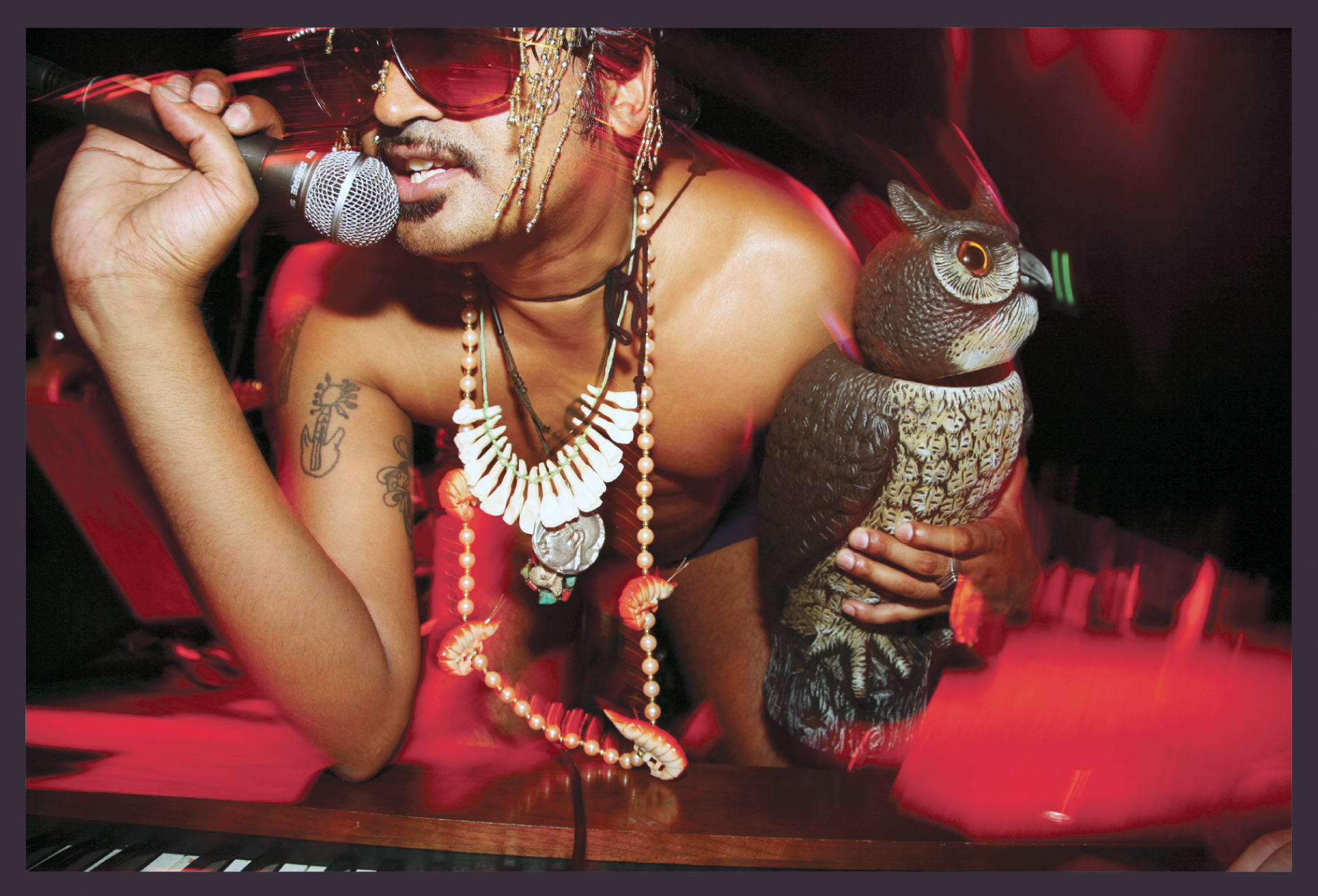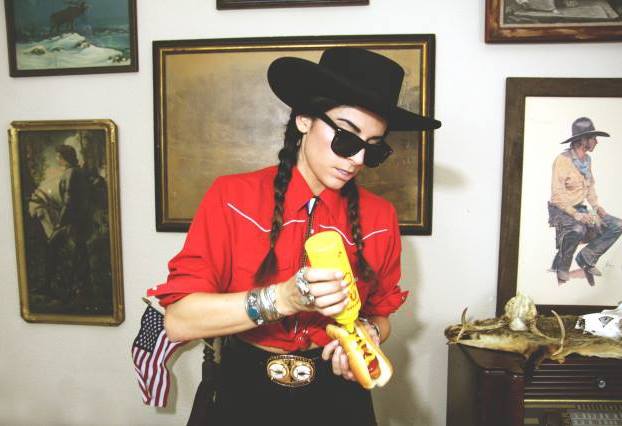In today’s music story, Arish “King” Khan talks about the dark days—and six year gap—that preceded the release of his fourth album, Idle No More, with his mainstay group the Shrines. Even as he explains the personal losses and self-described “craziness” that inspired the new record, the artist still exudes a vibrant, positive energy and is eager to share his experiences in what appears to be (to me, at least) the spirit of catharsis and connection. There was so much great material, in fact—buoyed by this great interview here—we felt compelled to share the whole interview, too. King Khan and the Shrines play Neumos tonight.
You recently signed with Merge records. How did you get connected with the label and are you a fan of Superchunk? I remember Superchunk when I was really young, but I’ve never seen them. A lot of labels showed interest when we were shopping our new record, they were super enthusiastic, and we decided to go with them. Plus, I love working with people from the south, we talked a lot about curing meat.
Do you cure your own meat? It’s something I’ve always been interested in. Laura [Ballance, Superchunk, Merge co-founder] actually told me about the time she tried to cure liver once, and it didn’t work. [Meat] is interesting, though. I was in Jakarta recently and we ate these crispy fried beef lungs, and they were amazing, a lot like prawn chips. Do you know prawn chips?
Are they like snap pea crisps? Well, prawn chips are what you find in, like Vietnamese stores, they’re these spongy, crunchy chips. That’s what the beef lungs were like.
So…it sounds like it’s been all good at Merge so far, a group that has a reputation as one of the most venerated labels in independent music. Is a move to their camp something you hope will change the perception of your music as psych-addled, party tunes? I guess I never thought about it like that, where the music should go, but there is definitely a more serious kind of feel to the new record. It definitely fits in that way, but I never thought about it like that.
Will Merge release your long-rumored project with the GZA? That unfortunately, I don’t think will happen. I had a really good time with him. But that was around the same time, about three years ago, when I went pretty crazy .
What happened? I was on tour with the Almighty Defenders [members of the Black Lips and Mark Sultan, of The King Khan & BBQ Show], and things were really crazy. We were invited to play the Sydney Opera House with Lou Reed and Laurie Anderson. Hanging out with those two was pretty surreal. I spent a night in jail in Barcelona, my head was in a crazy spin. I befriended a homeless aboriginal guy and I wanted to join the Black Panthers with him.
What did you guys do? I introduced the homeless man to Lou Reed, it put a big smile on Lou Reed’s face. I took him all around.
Then what? A few days later I joined a Buddhist monastery in Korea. I thought I was going to become a Buddhist monk, and I was going to quit music. I called my family and friends and told them my plan, and that’s when they intervened. I decided to accept their help and get my mind soaked in psychiatric drugs. That’s why it took so long to finish this record. There were two or three years of just me fixing myself.
That sounds like the stuff of record-making gold–drug-addled visions and globetrotting benders. Yeah, back then I wasn’t sleeping, I was planning this weird crazy vision. What’s even more synchronistic is that a month before all that stuff happened is that filmmaker Alejandro Jodorowsky, who’s one of my biggest heros, invited me to his house in Paris and we hung out and he taught me stuff about the tarot. I remember him looking at me in the eyes and saying, “You better be careful. This is the year of your crucifixion.”
Dude. He just made a film, about stuff in the ‘70s. His other movies are Holy Mountain and El Topo. You know, John Lennon and George Harrison helped him make his films. He’s from the tradition of Fellini, kind of. His movies are so psychedelic and heavy duty. He’s written a lot of books and has a following regarding his spiritual teachings, so I was honored to get invited to his house. He’s this guy, even though he’s 84, he’s so busy, flying everywhere, delivering lectures, writing 800 page novels. You should really check him out!
I will. Another crazy thing happened in Korea. I had a mohawk and one day I just decided to shave it off. I found out that later that one of my old friends from Montreal died that day, and he was Mohawk—Native American. I guess one of the reasons I went as far as I did with the craziness was that I lost three friends in a few years and I didn’t grieve properly. But I felt like I was protected by something, even when I was going crazy.
Do you think [your former label] Vice encouraged you to be crazy like that? It’s funny, when Vice started I was 17 and I was writing for them way back then. When I moved to Germany I was 20, I stopped writing for them and started doing my own thing. The Black Lips, who I had known for a long time, introduced me to them, and I needed a vessel to bring the Shrines over to North America, and they were really into pimping it. Spreading the good word. Though I was kind of a separate entity by then. They’re alright. But now they’re like the CNN of music.
Like the gonzo CNN. Back then I’d get 50 bucks an article and piece together rent around Montreal. You know, Vice actually started as three guys with a government grant to get them off welfare.
Is that what inspired the song “Welfare Bread?” Well, actually, no. In Germany, I was on welfare for a few years to help me play shows and focus on making music. Once we moved to the city, to Berlin, we went to the welfare office, and it was like a Kafka novel. There was this crazy snake of a line, and you had to talk to these poor people, thousands of them, with all kinds of stories, and it was heartbreaking. It was really stressful on my wife, and I thought, I’ve got to get off of this. So I really started to bust my ass more, and thankfully we’ve been off welfare for nine years.
How did you end up in Germany? When I was 21, 22, I was touring there and I fell in love—literally. So I stayed here, started a family, started the Shrines.
It sounds like you have an incredibly understanding family who support you on your journey with music. Yes, they’re amazing people. In fact, Hunx [of Hardly Art group Hunx and His Punx] just put out a single of my daughter Saba Lou, of a song we wrote together when she was eight years old. One of them is about good habits and bad and telling secrets, and she sings on it. My youngest daughter Bella has been doing some been rock stuff too.
You’re just about to start a North American tour. Any trepidation about visiting our gun-obsessed nation? No way, I love America, I’m kind of shocked how crazy it is right now with all the Republican terrorism. It’s amazing what happens when people in charge truly don’t care about people. But for truly power hungry entities, their evil becomes more and more obvious. I don’t want to get all political on you, though.
Tell me about the band you’re bringing with you. Hell Shovel? They’re awesome. The main singer, Jeff Clarke, he’s with [Montreal band] Demon’s Claws. They used to tour with us in Latin America. He’s got this really awesome psych-country-rock sound, like Conan the Barbarian-country. I don’t think there’s anyone who could do what he does.
As a full time Berliner, do you ever miss the Canadian rock scene? I remember when we [Khan and Mark Sultan] were teenagers doing the Spaceshits. There were so many bands that were jealous that we had records on labels in Japan or California, and wondered why we had so many fans of our crazy rock music. We had more fun travelling around and coming to Europe [than we ever did in Canada], especially because here there’s such a veneration for rock, soul, and garage styles of music, so I find a lot of people who love what we do. Things are changing though, and I’ve always loved going to America and more and more people are really supporting the music.
What’s the deal with Doner kebab? I can never eat one without it spilling all over the place. The trick to a good Doner kebab is the shape. The shape they have here is a quarter of a circle, and they keep the round part together, which keeps the filling inside. You just have to get a good one!








